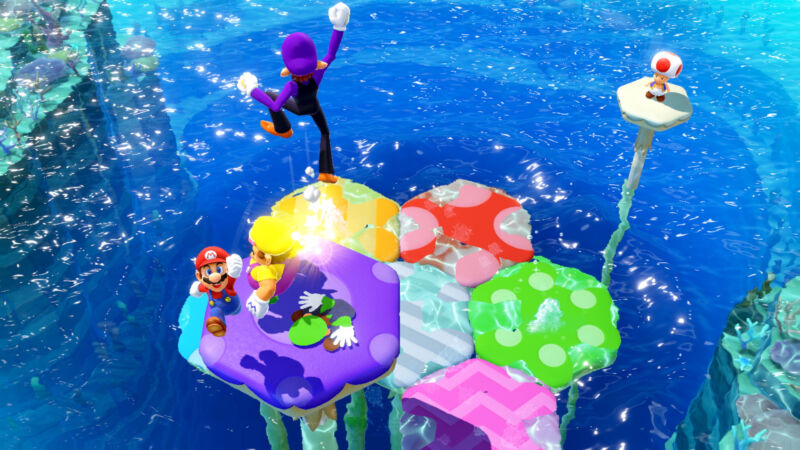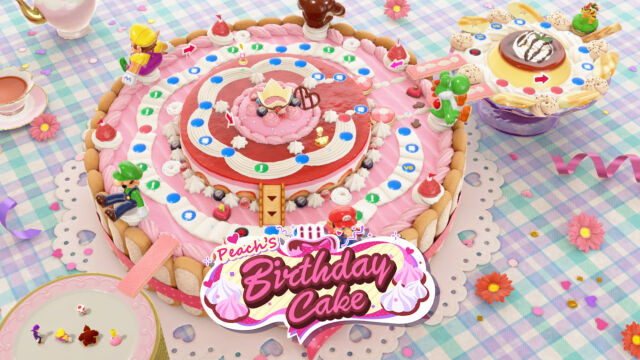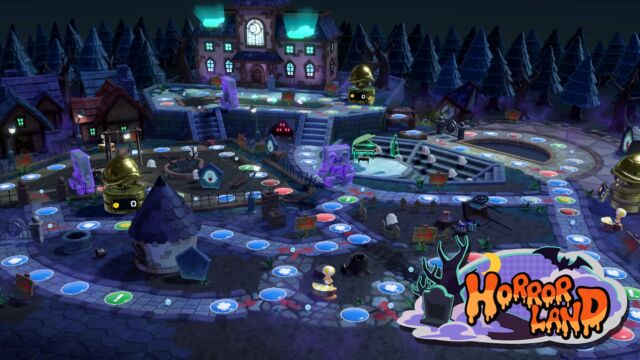
Since the Mario Party series launched in 1998 on the N64, it has played host to over 1,000 mini-games spread across 15 titles (depending on how you count). The question behind Mario Party Superstars on the Switch is whether you can find 100 of those mini-games that are actually good.
The answer is a resounding yes. By focusing on the best and most enduring mini-game design from over two decades, Superstars is probably the most consistently enjoyable game in the series’ long run. But if you’re not already on board with Mario Party‘s slow pace and heavy reliance on luck, there’s nothing here that will change your mind.
Better to be lucky than to be good
Mario Party Superstars is a game dripping with nostalgia, from the music and sound effects to the menu screen drawn straight from the first game. The structure of the main game is completely unchanged as well. Four human or computer-controlled players take turns rolling a 10-sided die to move around a board, trying to pass spots where they can buy the stars needed to win the game. After everyone has rolled, all four players face off in a mini-game where they can earn coins that can be used to buy stars or items that can help them or hinder others.

Mario Party Superstars [Switch]
Nintendo has made some strong choices for the five available classic boards, which come from the N64 editions of the game. The options offer a full range of complexity, from the basic “walk in a circle” of Yoshi’s Tropical Island to the constantly branching paths of Woody Woods to the complicated day-night cycle of Horror Land. Series fans will get a kick out of seeing these classic boards fully upgraded for the HD era, too—Peach’s birthday cake, in particular, is a mouth-watering visual splendor compared to the unappetizing low-res polygons of the N64 original.
Nintendo has thrown in some small quality-of-life improvements to help the slow pace of moving around these boards, too. You can now fast-forward through cut-scene animations, for instance, and you don’t have to watch as computer players compete in mini-games and item games without any human intervention. “Fast” options for movement speed and text mean you can also blow through a lot of the tedious waiting for your turn to come around, especially when playing against multiple computer opponents (you can also throw some emoji-style Mario-themed stickers on the screen to pass the time in between turns).
But none of these improvements changes the core gameplay of Mario Party, which, for good or ill, is still heavily dependent on luck. Sure, there is some basic strategy involved in navigating the boards skillfully, especially when it comes to deciding when to buy and use items to their best effect. And yes, winning more coins from mini-games still has a decent correlation with doing well in the overall match.
Still, a huge portion of the outcome of a Mario Party Superstars match depends on nothing more than rolls of the dice and the huge swings that can come from landing on certain spaces. No matter how skillfully you play, there’s often nothing you can do to prevent a lucky player from reaching a star before you. You can’t always avoid landing on a coin-sapping Bowser space or encountering a Chance Time space that transfers your hard-earned stars to another player in one fell swoop.

With the right group of friends (and possibly the right beverages), it’s possible to let go and accept this chaos, laughing and cringing along with your playmates as the whims of chance affect your fates. If you want a game that directly rewards skillful play relative to your opponents, though, Mario Party is still the last place you should look.
Maximum mini-games
In most Mario Party titles, every random mini-game selection meant waiting to see if you would end up with a fun, well-designed option or a tedious time-waster. Mario Party Superstars largely avoids this problem, removing most of the tedium by picking the cream of the crop for a veritable Greatest Hits album of previous games’ mini-game selections.
There are still a small handful of mini-games that are completely dependent on luck, amounting to a coin flip drawn out over a couple of minutes. And there are a few more that measure nothing but how fast you can mash a button or two, a tedious exercise in the best of circumstances.

https://arstechnica.com/?p=1808438

